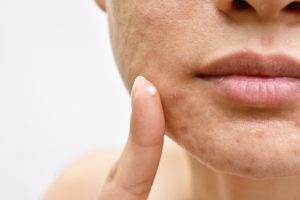The solution of eczema, which seriously affects the quality of life, is not as difficult as it seems. However, at this point, it is necessary to be careful in everything from nutrition to clothing.
Providing information on eczema, Pharmacist Hasan Tahsin Arslan, said, “There are many types of eczema according to the shape of the lesions and where they are located. Such as Atopic Eczema, Seborrheic Dermatitis, Asteatotic Eczema, Contact Eczema, Numular Eczema, Discoid Eczema, Venous Eczema. Drying, redness and itching are the most important findings that distinguish eczema from other skin disorders, as the skin cannot retain water (10%) due to the deterioration of the barrier on the skin surface. Infinitely fried, roughening is seen on the skin. The flaking characteristic of psoriasis is not seen in eczema.”

What triggers eczema
Drawing attention to the factors that trigger eczema, Arslan said, “Herbal and chemical allergens, hepatitis B and C viruses, products such as soap, detergent, latex gloves, bleach, diabetes and chemotherapy drugs, beta-blockers, lithium-containing antidepressants and some antibiotics affect the body directly. and they trigger eczema.”
Stating that the treatment of psoriasis and eczema is not to tire the liver, Arslan said, “People with psoriasis and eczema should definitely stay away from foods that will put pressure on their liver. Avoid all foods and beverages containing sugar, fried foods, bakery foods and alcoholic beverages.”

Nutrition is very important
Pointing out that the effect of our eating habits on eczema is far beyond what is thought, Arslan said that people with eczema should have an alkaline diet and that nutrition is as important as drugs in treatment.
According to the information provided by Arslan, the foods to be avoided are as follows:
- All foods and beverages with sugar
- All foods with flour
- Fries
- Alcoholic beverages
- High-sugar fruit and dried fruit
- Energy drinks
Foods that must be consumed are:
- Parsley, Arugula, Lettuce, Cucumber
- Lemon
- All Vegetables (except broad bean, nettle)
- Cheese varieties, olive varieties
- Seasonal salads
- Natural Yogurt, Kefir
- Omega 3 and Olive Oil
It is necessary to pay attention to even the outfit
Recalling that those with eczema should take care of their clothes as well as their meals, Arslan gave the following information about what should be applied in daily life:
- Avoid woolen and polyester clothes and use cotton clothes.
- Since itching attacks cause further enlargement and deterioration of eczema lesions, they should be minimized with diet and an antihistamine tablet that your doctor deems appropriate, and should not be neglected.
- The humidity and temperature of the environment you are in should be tried to be adjusted so that it does not trigger eczema lesions even more.
- Optimum conditions should be provided by using air conditioner (for humidity), ventilation.
- Drink plenty of water.
- Care should be taken to ensure that the treatment, repair and care creams that should be used for our eczema lesions are products with safe ingredients recommended by your doctor or pharmacist. Other statements should not be listened to, the product to be used should be examined.
- Solarium should be avoided as it has risks. In addition, the sun should be avoided between 11.00-17.30 and the duration of sunbathing should not exceed 15 minutes.
- Bathing frequency should be every other day unless necessary. Cuts and fibers should be avoided. Gloves must be used for large-scale cleaning. Shampoos are one of the most important issues for people with eczema. Only baby shampoo and baby soap should be used, since soaps to be used for cleaning their skin have the risk of containing caustic.
- They should stay away from cosmetics and jewelry, which can be the cause of contact eczema, and prefer safe ones.
- Avoid dusty and cigarette smoke environments.
Skin-friendly products
Hasan Tahsin Arslan also gave information about skin care. Underlining that people with eczema should take care to include glycerin, olive oil, urea, Vitamin E, and Panthenol in their skin care products, Arslan said, “Hair dyes with allergenic effects, soaps containing caustic (NaOH), cleaners and all lotions, high salicylic acid content. All creams containing urea, products containing high doses of urea such as 30 percent, alcohol-containing cleaners should be avoided. On the other hand, there are also skin-friendly products. It should be rich in urea, dexpanthenol, vitamin E and antioxidant form. In the meantime, it should contain glycerin and vegetable oil, which provides deep nourishment and moisturizing of the epidermis.”


